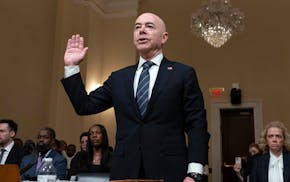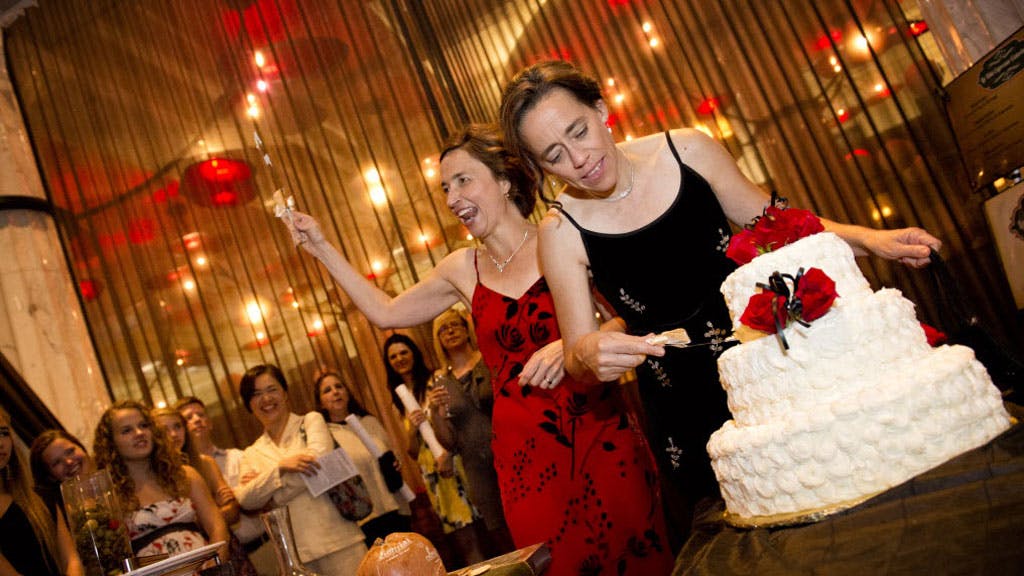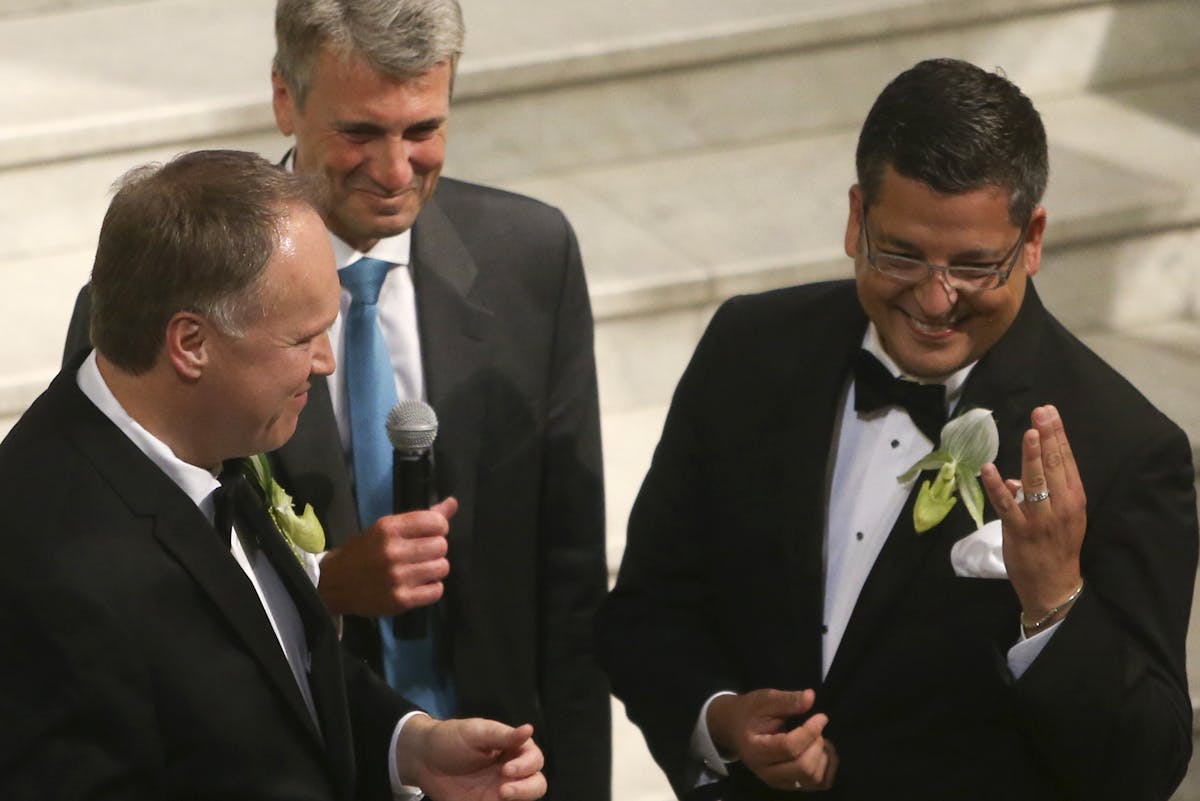The streets outside Minneapolis City Hall were filled with newly-wedded gay and lesbian couples reveling in their new marital status Thursday morning while inside dozens more waited their turn in lines that lasted until dawn.
Down the street at the Hotel Minneapolis, Cathy ten Broeke and Margaret Miles, the first couple legally wed in Minnesota, partied into the night, wearing the same slinky dresses they wore 12 years earlier at their commitment ceremony. This time, ten Broeke said with some satisfaction, was different because this "was the state of Minnesota committing to us and our family."
Mayor R.T. Rybak worked through the night and early morning hours, officiating the weddings of 42 gay and lesbian couples on the marble steps of the City Hall Rotunda where, at the bottom, the massive Father of Waters statue was surrounded by folding chairs, wedding guests and dozens of clicking cameras.
By 2 a.m. the scene inside and outside remained festive and untroubled. Food trucks lined up as newlyweds and other attendees ordered tacos and omelets or stepped outside for a break from the steamy City Hall air. Jitneys waited to whisk couples away to nearby hotels. Just as with heterosexual weddings, a white stretch limo, "Just Married" flags flapping, parked outside to escort a wedding party.
From Minneapolis and St. Paul to Duluth and Crookston, dozens of gay and lesbian couples tied the knot in the pre-dawn hours Thursday as Minnesota became the 13th state to legalize same-sex marriage. Couples and guests gathered in city halls, a conservatory, the Mall of America — even a bar — to be among the first to usher in a new era of marriage equality in Minnesota.
Rybak married ten Broeke and Margaret Miles at the beginning of a rapid-fire wedding ceremony unprecedented in City Hall.
"Margaret and Cathy," the mayor said seconds after midnight, "by the power now finally vested in me, by the laws of the people of Minnesota, we hereby declare Margaret and Cathy legally married. You may now kiss the bride."
The ceremonies across the state capped a polarizing and expensive political fight that settled the question of law while leaving Minnesotans still divided over same-sex marriage.
But for those forced to keep their love and relationships secret for years, even decades, the moment of legalization signaled a status that once seemed out of reach: Newlyweds.
"Our wedding will be about celebration and commitment, but will also be about sharing our lives to help people better understand how much the same we all are," said Phil Oxman, who married his partner 38 years shortly after 1 a.m. in Minneapolis City Hall.
The path to marriage equality, after simmering in the state for decades, took an unlikely and circuitous route in Minnesota.
Two years ago, Republican legislative leaders put a measure on the ballot that would have taken an existing ban on same-sex marriage and etched it in the state Constitution, making it virtually impossible to overturn. Thirty other states had already passed a similar same-sex marriage ban and most political watchers saw no reason Minnesota wouldn't follow suit.
But after an unprecedented campaign that mobilized thousands of volunteers and drew millions of dollars in donations, Minnesota became the first state to reject such a measure, although a statute still banned gay marriage. Soon after, the supporters that engineered the constitutional win harnessed their enormous political machine to persuade lawmakers to move ahead with full-scale legalization.
On May 14, Gov. Mark Dayton signed the legalization bill into law. Leading up to the first weddings, Dayton issued a proclamation declaring Thursday "Freedom to Marry Day" in Minnesota.
State officials expect 5,000 same-sex couples to wed the first year.
After getting a standing ovation at the Minneapolis wedding, Dayton said that "All I did at the end was sign my name on a piece of paper, which is really not that hard once you get the hang of it. The real credit for this transformative event in Minnesota goes to all of you and all the LGBT women and men throughout Minnesota who had the courage to stand up and say, 'We want the same rights as every other American. It's our constitutional right, it's our moral right."
The new law includes protections to ensure that churches and religious leaders who oppose same-sex marriage can decline to wed gay and lesbian couples.
But opponents say that's little comfort as they witness what to them is a wrong turn in the state's history.
"This is a sad day in our state for the majority of Minnesotans who still believe that marriage is the union of one man and one woman as God designed," said Autumn Leva, spokeswoman for Minnesota for Marriage, which led opposition to same-sex marriage. "We are grieving because we understand that Minnesota's families, children, and religious liberty rights will all pay the price for the decision made by a group of legislators to force a gender-neutral society on our state."
Joe Stiles, 65, of Owatonna, said he feels like Minnesota and the nation are reaching a crucial tipping point — away from the values and beliefs he holds dear. "I am more sad and disappointed, rather than angry," he said. "It may take a couple of decades before society wises up and realizes what we've done by watering down and diminishing the importance of marriage."
"Marry Us"
Shortly before midnight in Minneapolis, more than 500 people poured into City Hall and were greeted by the scent of white roses, lilies, stocks and orchids, garlands strung across balconies and around pillars, and multicolored lighting that dramatically staged the staircase where the weddings would take place.
The Twin Cities Gay Men's Chorus lined the stairwell to sing before the first ceremony, all wearing black T-shirts with the words, "Marry Us."
The first male couple to wed at Minneapolis City Hall, Al Giraud and Jeff Isaacson, each had a lady slipper, the state flower, tucked into their boutonnieres.
"It was awesome. It was magical," said Al Giraud, who married Isaacson, shortly after ten Broeke and Miles were wed.
Witnessing the scene, Rybak said that "the fact that it's happening now is really almost mind-boggling and exciting for me."
The mayor's matrimonial marathon began the day the Legislature legalized gay marriage back in May. As the crowds cheered, a jubilant Rybak had shouted out to the crowds in the Capitol rotunda: "If this thing passes, come on down to City Hall and we'll marry you!"
He didn't realize how many people would take him up on that offer.
"We could have done hundreds of weddings tonight," he said late Wednesday evening. "We cut it off at 42."
After the initial, high-profile weddings came quieter ceremonies: Two middle-aged men in gray sport coats clasped hands, one of them shaking slightly, as Rybak officiated in a tone too soft for anyone but them to hear. When it was over, Lars Peterssen and Robert Zimmerman kissed, embraced and turned away from the crowd to quickly wipe a tear before they lined up for their wedding portrait.
Ten Broeke said she's hopeful that the day marks a turning point not just for couples like her and Miles but for children. Six weeks ago, she said, their son innocently told classmates that his two moms were getting married only to have one retort, "Two women can't get married!" Now, she said, "I don't think anyone is going to say that to him anymore. Today changes so much for the next generation."
At the Hotel Minneapolis, a steady stream of couples and guests rolled in and out, dancing, eating, drinking, gleefully throwing their hands in the air as "It's Raining Men" played.
From hopeless to happy
Only eight months after they despaired of ever getting to the altar, Reid Bordson and Paul Nolle, partners for 13 years and fathers of a 21-month-old daughter, said "I do" and were pronounced legally married at a midnight ceremony in St. Paul.
It was the Capitol city's first same-sex marriage, and the fragrance of the summer floral display in the Como Conservatory's sunken garden mingled with high emotions and a historic first.
"To know we got married, the first couple in the Capitol city, where all the political activism happened, it's insane," Bordson said after the event. "We're part of history."
Bordson and Nolle, both 35, were certain last October that same-sex marriage would be prevented by a proposed constitutional amendment.
With their parents, daughter Anna, and siblings, the two grooms processed down the garden pathway promptly at midnight. Friends filled the paths of a garden in full summer bloom. Officiant Heather Fairbanks, performing the first of five services in 24 hours, spoke of the sacrifices activists had made over the years to arrive at this moment.
"Legal marriage has long been termed a civil right," Fairbanks said. She said the grooms wanted to thank all those who worked for gay rights, "not only for their family, but for generations to come."
The two men exchanged Irish wedding rings to go with commitment rings they exchanged at a non-binding ceremony 10 years ago this week. They will wear the wedding bands on the left hands and the commitment rings on the right.
The men responded to Fairbanks' vows of lifelong commitment with a hearty "I do," and involved a somewhat tired but placid Anna in the ceremony. When Fairbanks pronounced the men legally married, and they sealed it with a kiss, the room burst into a lengthy ovation.
Bordson, Nolle and Anna — who will all carry the name Bordson-Nolle — danced to the recessional song, "Ho Hey" by the Lumineers. The group moved to a private reception and a Betty Crocker cake that bore a black bow tie around the middle layer and flowers, not two grooms, on top.
"We are just overjoyed," said Bordson's mother, Debby Bordson of Duluth. "I've been crying all day. Just full of joy. ... This state believes in the rights of people to marry who they want to. That's what makes me so proud to be from Minnesota."
"We're pretty numbed and thrilled right now," Bordson said. "We didn't know if this day would ever be coming in Minnesota."
The wedding was the first of 13 scheduled in the city on Thursday — including one heterosexual couple who had picked the day and the same sunken garden venue long ago.
Last year, they were resigned to living in a state where same-sex marriage was prohibited, as it is in Wisconsin. But the election result and legislative action changed all that. "To think that within a year it turned around, and it actually didn't get banned, but became legal, we were just kind of shocked," Bordson said.
Going to the Chapel
Over at Mall of America, Holli Bartelt and Amy Petrich wed at the mall's Chapel of Love.
Chapel owner Felicia Glass-Wilcox said she thought couples like Bartelt and Petrich should feel as welcome as any other couple.
"We are in the business of love and this should be a celebration," she said.
But Glass-Wilcox was taking precautions. After getting a nasty call from a gay marriage opponent, she opted to have a security detail on hand for the midnight nuptials.
Glass-Wilcox said she's opening her doors at that hour because she wanted same-sex couples to have an option other than a city hall or government building.
"It was important that everybody knew there was an avenue to get a Christian marriage," she said, "and that not all ministers are against this."
Jim Ragsdale • 651-925-5042
Jennifer Brooks • 651-925-5049
Baird Helgeson • 651-925-5044
New Black congressional district in Louisiana bows to politics, not race, backers say
Trump trial jury selection process follows a familiar pattern with an unpredictable outcome
Climate change concerns grow, but few think Biden's climate law will help, AP-NORC poll finds


